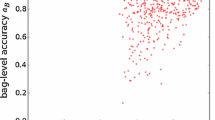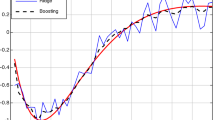Abstract
In this paper we present a boosting approach to multiple instance learning. As weak hypotheses we use balls (with respect to various metrics) centered at instances of positive bags. For the ∞-norm these hypotheses can be modified into hyper-rectangles by a greedy algorithm. Our approach includes a stopping criterion for the algorithm based on estimates for the generalization error. These estimates can also be used to choose a preferable metric and data normalization. Compared to other approaches our algorithm delivers improved or at least competitive results on several multiple instance benchmark data sets.
Chapter PDF
Similar content being viewed by others
Keywords
- Neural Information Processing System
- Generalization Error
- Multiple Instance
- Weak Hypothesis
- Multiple Instance Learning
These keywords were added by machine and not by the authors. This process is experimental and the keywords may be updated as the learning algorithm improves.
References
Amar, R.A., Dooly, D.R., Goldman, S.A., Zhang, Q.: Multiple-instance learning of real-valued data. In: Proceedings of the Eighteenth International Conference on Machine Learning (ICML 2001), pp. 3–10. Morgan Kaufmann, San Francisco (2001)
Andrews, S., Tsochantaridis, I., Hofmann, T.: Support vector machines for multiple instance learning. In: Advances in Neural Information Processing Systems 15. Papers from Neural Information Processing Systems (NIPS 2002), MIT Press, Cambridge (2002)
Auer, P.: On learning from multi-instance examples: Empirical evaluation of a theoretical approach. In: Proceedings of the Fourteenth International Conference on Machine Learning (ICML 1997), pp. 21–29. Morgan Kaufmann, San Francisco (1997)
Auer, P., Long, P.M., Srinivasan, A.: Approximating hyper-rectangles: Learning and pseudorandom sets. J. Comput. Syst. Sci. 57(3), 376–388 (1998)
Blake, C.L., Merz, C.J.: UCI repository of machine learning databases. Irvine, CA: University of California, Department of Information and Computer Science (1998), http://www.ics.uci.edu/~mlearn/MLRepository.html
Dietterich, T.G., Lathrop, R.H., Lozano-Pérez, T.: Solving the multiple instance problem with axis-parallel rectangles. Artif. Intell. 89(1-2), 31–71 (1997)
Freund, Y., Schapire, R.E.: A decision-theoretic generalization of on-line learning and an application to boosting. J. Comput. Syst. Sci. 55(1), 119–139 (1997)
Goldman, S.A., Kwek, S.K., Scott, S.D.: Agnostic learning of geometric patterns. J. Comput. Syst. Sci. 62(1), 123–151 (2001)
Gärtner, T., Flach, P.A., Kowalczyk, A., Smola, A.J.: Multi-instance kernels. In: Machine Learning. Proceedings of the Nineteenth International Conference (ICML 2002), pp. 179–186. Morgan Kaufmann, San Francisco (2002)
Fussenegger, M., Opelt, A., Pinz, A., Auer, P.: Object recognition using segmentation for feature detection. Accepted for ICPR 2004 (2004)
Klivans, A., Servedio, R.A.: Learning DNF in time 2O(n1/3). In: Proceedings on 33rd Annual ACM Symposium on Theory of Computing (STOC 2001), pp. 258–265. ACM, New York (2001)
Littlestone, N.: Learning quickly when irrelevant attributes abound: A new linear threshold algorithm. Machine Learning 2(4), 285–318 (1988)
Maron, O.: Learning from ambiguity. Technical Report AITR-1639 (1998)
Maron, O., Lozano-Pérez, T.: A framework for multiple-instance learning. In: Advances in Neural Information Processing Systems 10 (NIPS 1997), MIT Press, Cambridge (1998)
Maron, O., Ratan, A.L.: Multiple-instance learning for natural scene classification. In: Proceedings of the Fifteenth International Conference on Machine Learning (ICML 1998), pp. 341–349. Morgan Kaufmann, San Francisco (1998)
Opelt, A., Fussenegger, M., Pinz, A., Auer, P.: Weak hypotheses and boosting for generic object detection and recognition. In: Pajdla, T., Matas, J(G.) (eds.) ECCV 2004. LNCS, vol. 3022, pp. 71–84. Springer, Heidelberg (2004)
Ramon, J., Raedt, L.D.: Multi instance neural networks. In: Proceedings of IMCL 2000 workshop on Attribute-Value and Relational Learning (2000)
Ruffo, G.: Learning single and multiple instance decision trees for computer security applications. Doctoral dissertation. Department of Computer Science, University of Turin, Torino, Italy (2000)
Scott, S.D., Zhang, J., Brown, J.: On generalized multiple-instance learning. Technical report UNL-CSE-2003-5, University of Nebraska (2003)
Schapire, R.: The boosting approach to machine learning: An overview. In: MSRI Workshop on Nonlinear Estimation and Classification, Berkeley, CA (March 2001)
Schapire, R.E., Freund, Y., Bartlett, P., Lee, W.S.: Boosting the margin: A new explanation for the effectiveness of voting methods. Ann. Statist. 25(5), 1651–1686 (1998)
Wang, J., Zucker, J.D.: Solving the multiple-instance problem: A lazy learning approach. In: Proceedings of the Seventeenth International Conference on Machine Learning (ICML 2000), pp. 1119–1126. Morgan Kaufmann, San Francisco (2000)
Wang, C., Scott, S.D., Zhang, J., Tao, Q., Fomenko, D.E., Gladyshev, V.N.: A study in modeling low-conservation protein superfamilies. Technical report UNLCSE-2004-0003, University of Nebraska (2004)
Zhang, Q., Goldman, S.: EM-DD: An improved multiple-instance learning technique. In: Advances in Neural Information Processing Systems 14 (NIPS 2001), pp. 1073–1080. MIT Press, Cambridge (2001)
Author information
Authors and Affiliations
Editor information
Editors and Affiliations
Rights and permissions
Copyright information
© 2004 Springer-Verlag Berlin Heidelberg
About this paper
Cite this paper
Auer, P., Ortner, R. (2004). A Boosting Approach to Multiple Instance Learning. In: Boulicaut, JF., Esposito, F., Giannotti, F., Pedreschi, D. (eds) Machine Learning: ECML 2004. ECML 2004. Lecture Notes in Computer Science(), vol 3201. Springer, Berlin, Heidelberg. https://doi.org/10.1007/978-3-540-30115-8_9
Download citation
DOI: https://doi.org/10.1007/978-3-540-30115-8_9
Publisher Name: Springer, Berlin, Heidelberg
Print ISBN: 978-3-540-23105-9
Online ISBN: 978-3-540-30115-8
eBook Packages: Springer Book Archive




